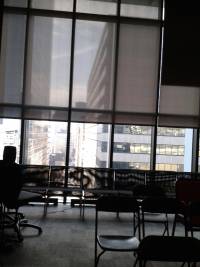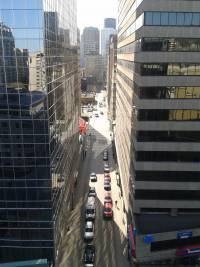Interactivity in Music Composition and Performance - Montreal 2015
CIRMMT - Centre for Interdisciplinary Research in Music Media and Technology
May 5th 2015
527 Sherbrooke St. West
Montreal, Quebec
This meeting stands at the mid-term of the EFFICACe research project. It aims at making-up for past achievements and drawing perspectives and collaborations around a common problematics related to musical interactions in compositional systems. It is jointly organized by the project team and the Centre for Interdisciplinary Research in Music Media and Technology (CIRMMT) in Montréal.
The workshop will gather members of IRCAM (France), McGill University (Canada), Concordia University (Canada), CNMAT/UC Berkeley (USA), UC Irvine (USA) around talks and discussions related to the current research directions in computer systems for music composition.
It is supported by the International research seminar programme of Sorbonne Universités and the French National Research Agency (ANR).
The access to the workshop is free but registration is mandatory as seating is limited:
⇒ http://www.cirmmt.org/activities/workshops/research/efficace_workshop_2015/
Special Issue of the Journal of New Music Research
Interactive Processes in Music Composition and Performance
⇒ call for paper
Ce séminaire a bénéficié d'une aide de l’Etat gérée par l'Agence Nationale de la Recherche au titre de l’Idex Sorbonne Universités dans le cadre du programme "Investissements d’avenir" portant la référence ANR-11-IDEX-0004-02. Convention attributive SU-15-I-PSRI-03.
Program
| 09:30 |
| Introduction to the workshop Jean Bresson (Ircam - UMR STMS) |
|---|
| 09:45 |
| Prescriptive and Descriptive Notational Strategies for Polytemporal Composition John MacCallum (CNMAT, UC Berkeley), Teoma Naccarato |
| We will discuss the use of rhythmic structures and notation in interactive music and computer-aided composition. In recent projects we have been interested in working with variable (and sometimes nondeterministic) tempos. Working with polyphonic tempo variations is a musical and scientific challenge: we will present some strategies and tools developed to cope with it. |
| 10:15 |
| Some Perspectives on Automated Creation, Expression, and Interaction Christopher Dobrian (UC Irvine) |
|---|
| Reflections on the distinctions between music made with a computer and music made by a computer. Approaches to imbuing the computer with musical 'knowledge' for artificial creativity, illustrated with examples. |
| 11:00 |
| Musicking the Body Electric: Towards a BodySuitScore Sandeep Bhagwati (Concordia University), Adam Basanta (Concordia University), Marcello Giordano (McGill University) |
|---|
| :body:suit:score (:b:s:s) is a four-year research-creation project that explores the technological, creative, and aesthetic possibilities and applications of mobile music performance through the use of vibro-tactile score information. Whereas traditional music performance emphasizes carefully placed sound sources and stationary audiences, :b:s:s seeks to generate technological capabilities and aesthetic frameworks that enable composers to treat spatial disposition and movement as an additional musical parameter. The project’s aim is to devise new compositions that can be played and experienced in motion. Presentation followed by a short performance. |
| 12:00 - Lunch Break |
| 13:30 |
| Interaction and Instruments Joel Chadabe |
|---|
| All musical instruments offer the challenge of interaction even when, as performers, we are not aware of it. Certain electronic instruments offer particular challenges that can be compared to sailing a boat in windy seas. |
| 14:30 |
| Authoring and processing of spatial sounds using Spat Thibaut Carpentier (Ircam - UMR STMS) |
|---|
| Spat is a software suite dedicated to realtime sound spatialization and artificial reverberation. It has been developed at Ircam for many years and it has now reached a quite mature state in terms of synthesis and rendering. However it is clear that there is still crucial need for representing, editing and authoring spatial data for music creation. In this talk we will present on-going work on the development of authoring tools, based on efficient and transparent communication bridges with digital audio workstations or computer-aided composition environments (such as OpenMusic). |
| Compositional tools for spatialization in OpenMusic Jérémie Garcia (Ircam - UMR STMS) |
| This talk will focus on interactive tools designed to help music composers controlling sound spatialization processes in the OpenMusic computer-aided composition environment. We conducted interviews with composers to understand their needs and inform the design of new compositional interfaces. These interfaces support quick input, visualization and edition of three-dimensional trajectories, as well as the control of the temporal dimension in spatial scene descriptions. |
| 15:30 |
| Musical Interaction Design Workbench And technologY Marcelo Wanderley (IDMIL - McGill University) |
|---|
| The MIDWAY associated team involves two partners: the InSitu group at Inria Saclay – Ile-de-France, and the Input Devices and Music Interaction Laboratory (IDMIL) from the Centre for Interdisciplinary Research in Music Media and Technology (CIRMMT) – McGill University. Our goal is to design and implement MIDWAY, a musical interaction design workbench, to facilitate the exploration and design of new interactive technologies for both musical creation and performance. |
| 16:00 |
| From Spatial Movement to Spatial Sound: Gesture representation and processing in OpenMusic Marlon Schumacher (IDMIL - McGill University) |
|---|
| This talk will discuss the integration of gesture data into the symbolic context of computer-aided composition and present tools for gesture representation and processing in OpenMusic. Thanks to the advent of digital technologies, sensing devices are ubiquitous now, allowing physical gestures to be included in computer-aided composition processes. Using a phenomenological representation, gestures can be segmented into objects, manipulated, and used in symbolic or sound synthesis processes. Some of the possibilities for the use of the tools will be demonstrated on examples of sensor recordings of dance performances. |
| 16:30 - Final discussion |
Practical information
Organisation:
- IRCAM – STMS:
Jean Bresson
Jérémie Garcia - CIRMMT/McGill University:
Marlon Schumacher
Robert Hasegawa
Location:
527 Sherbrooke St. West
Montreal, Quebec, Canada
⇒ more info
Registration:
The access to the workshop is free but registration is mandatory as seating is limited:
⇒ http://www.cirmmt.org/activities/workshops/research/efficace_workshop_2015/





